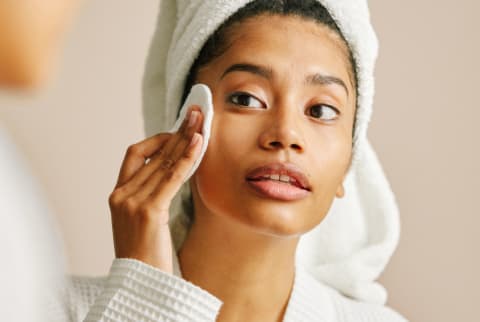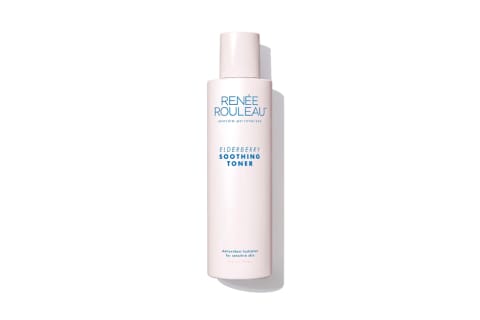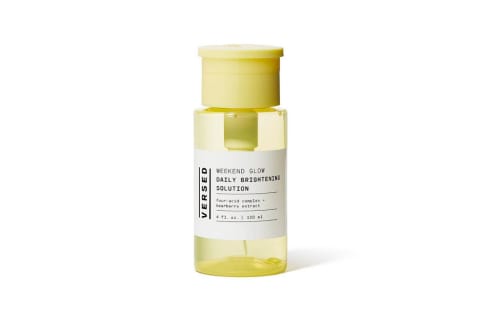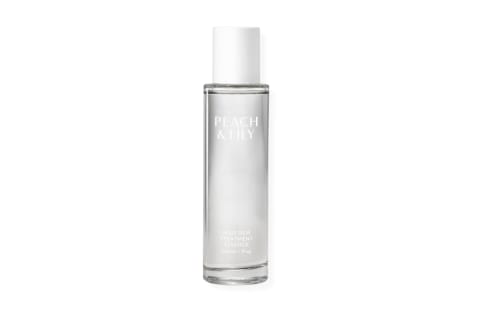Advertisement
What Toner Does For Your Skin, From Derms + Best Products To Shop


Some skin care products are fairly self-explanatory—take makeup remover, face wash, and moisturizer, for example. You can pretty much put two and two together to figure out the basic gist of their function. However more ambiguous steps can make skin care a bit more confusing.
One prime example: toner. While you may jump to the conclusion that toner is designed to even out skin tone, it's actually much more complex. Here, find out exactly what toner does, how to pick the best one for your skin type, and a few cult favorites to browse.
What is a facial toner?
"Toners can have many different functions depending on their active ingredients," board-certified dermatologist Rebecca Marcus, M.D., FAAD, tells mbg. Think of the word toner as an umbrella term encompassing many different, more targeted formulas.
"Traditionally, toners have been used to remove excess makeup residue and dirt after cleansing," Marcus explains. "Toners may be formulated with ingredients that serve to soothe, calm, exfoliate, or fight acne, for example," she continues.
That said, putting a hard label on the term toner doesn't exactly make sense in the vast world of modern skin care. However, if you'd like a basic definition, just know that toner typically comes in a liquid form and that you can apply it with your hands or a cotton round (opt for reusable rounds to keep your routine eco-friendly). From there, each toner can have a few basic functions.
What facial toners do for the skin
Again, the exact function of toners varies depending on the formula. Here, find a few of the most popular benefits:
- Balances pH: "Toners that are intended to balance pH most often lower the pH of the skin," Marcus explains. See, when your skin's pH is off, you're more likely to develop dry, sensitive skin and inflammatory skin conditions like acne. Plus, your skin's pH contributes to a healthy skin microbiome. Some toners even include pre- and postbiotics to feed that microbiome even more.
- Exfoliates & purifies: You can also opt for an exfoliating toner with AHAs or BHAs, if you really want to break down buildup. "By helping to eliminate buildup and residue, using a toner can help to prime the skin for the next step in a routine and may help to enhance the penetration of subsequent products," board-certified dermatologist Marisa Garshick, M.D., FAAD, explains.
- Hydrates: Finally, some toners solely add a cushion of hydration. Everyone can benefit from focusing on moisture, which is why you can find a plethora of hydrating, antioxidant-rich mists and tonics.
Do you really need one in your routine?
If you want to add a toner to your routine, there are plenty of grade-A products that will certainly benefit your skin. However, it's not the most important skin care product out there. (Surely not as vital as a nightly cleanse or daily SPF.) In fact, some experts deem it wholly unnecessary.
So, if you don't have the time or the budget to incorporate this step, don't stress about it. Many of the ingredients found in toners are included in other serums and moisturizers you may already have in your lineup.
If you're going to prioritize your skin care products, definitely pick SPF, cleanser, moisturizer, exfoliants, and retinol over toner. It's an extra step, sure, but it can be beneficial should you want to explore it.
How to use toner in your routine
A very simple guideline for how to use toner in your routine is this: After cleansing, but before serums or moisturizers. However, there are minor tweaks to this depending on your skin type, product type, and the other steps in your routine. Here, a few pointers.
- Some folks don’t wash their face in the morning—and use a toner in its place. In these cases your routine will start with a toning step. However, you should only do this when your skin is relatively clean—if you're wearing makeup, sunscreen or other products you’ll need to remove those first.
- If you have dry skin, a hydrating toner can be hugely beneficial to attract and hold water in the skin. For these folks, you can apply your toner on already damp skin. Then quickly follow with a hydrating serum or cream to amp up the hydration.
- If you plan on applying an antioxidant serum (especially vitamin C serum) be sure to let the toner dry completely. This will lessen the chance that the toner interacts with the serum, rendering it less effective.
- If you’re using an astringent toner (especially those with any drying ingredients or chemical exfoliants) you’ll want to avoid using it on days/nights that you are using a retinol or AHA/BHA serum. Using too many harsh ingredients can irritate your skin.
- Purifying toners can help remove residue left after the cleansing step. In which case you may only want to use these at night (to help remove makeup, for example), but don’t feel the need to use them in the morning.
How often should you use it?
The frequency of which you’ll use a toner is totally dependent on your skin needs and what type of toner you have. The general base line for use is 1-2 times a day. Since you use it after your cleansing step, it will likely just follow that routine. (However, some folks skip washing their face in the morning, and use a toner in its place.) There aren’t super strict rules with toners, so feel free to play around the frequency until you find a cadence that works for you.
Toner vs. astringent vs. essence
Here's where things get a bit tricky: Some products labeled as "toner" are technically more of an astringent or an essence. At the end of the day, it's all up to marketing. But here's the actual difference, according to experts:
Astringents
Astringents help soak up excess oil production and remove impurities that may have been left behind even after cleansing. Essentially, you can consider them extra-purifying toners, and they're great for those with oily or acne-prone skin. "Be careful not to overdo it, though, as astringent toners often contain alcohol and can be overly drying and disruptive to the skin barrier," Marcus warns.
Witch hazel is a popular choice because of its ability to gently balance the skin and regulate sebum production. Again, if you opt for witch hazel toner, look for an alcohol-free formula. You can read all about astringents versus toners here.
Essences
"Essences are designed to soothe irritation and help boost hydration," Garshick says. "They may also contain higher concentrations of active ingredients such as antioxidants and may help enhance penetration of subsequent products," she continues.
Essences will generally include ingredients like glycerin, aloe vera, hyaluronic acid, etc. For those with dry skin, an essence will provide a much-needed boost of hydration.
PSA: "While some people prefer one or the other, they can also be used in the same routine–first a toner and then an essence," Garshick says. Some people even apply multiple layers of an essence (called the "seven skin method") for an extra burst of hydration.
One important caveat:
FAQ
What does a toner do for your face?
In general, toners help balance, purify, and hydrate the skin. But like any category of product, the ingredients and formula will vary greatly—so how they specifically benefit the skin will also vary. Some are more plumping, calming, and moisturizing (like those with hyaluronic acid, aloe, and glycerin), some are more purifying and exfoliating (like those with AHAs).
Can I use toner everyday?
You can use toners daily, especially if they are formulated to hydrate, balance, and calm the skin. Some toners are more astringent or exfoliating, so you may want to use those less frequently depending how your skin reacts to the product.
Is a toner really necessary?
If you do not want to add another step to your routine, no, toners are not necessary. (Cleansing, moisturizer, and SPF are, however.) If you are interested in expanding your product arsenal, then toners can be beneficial for some as they help purify, balance, and even hydrate the skin.
The takeaway
If you thought toners simply helped even out skin tone, you're not alone. However, now you know that this skin care step is quite complex, and there's a variety of options to choose from for your skin type and concerns.
Generally, astringents can help balance oil production and remove impurities, while essences help boost hydration. If you want more clean toners to shop, check out this shopping guide for 13 different options.



